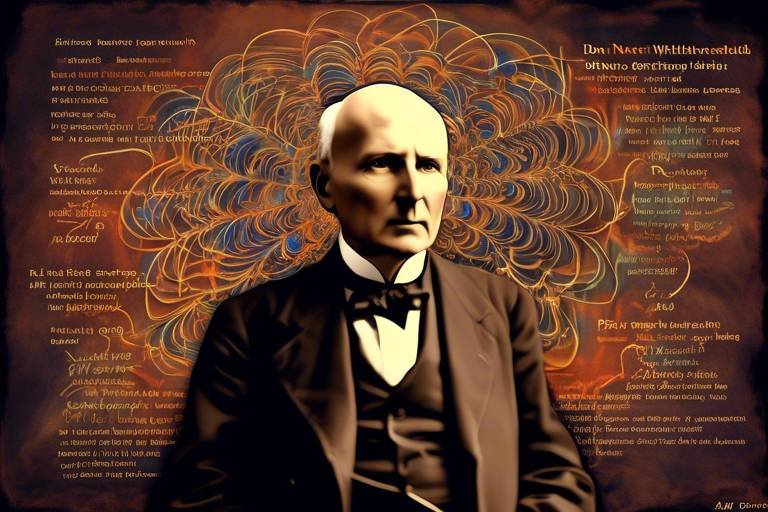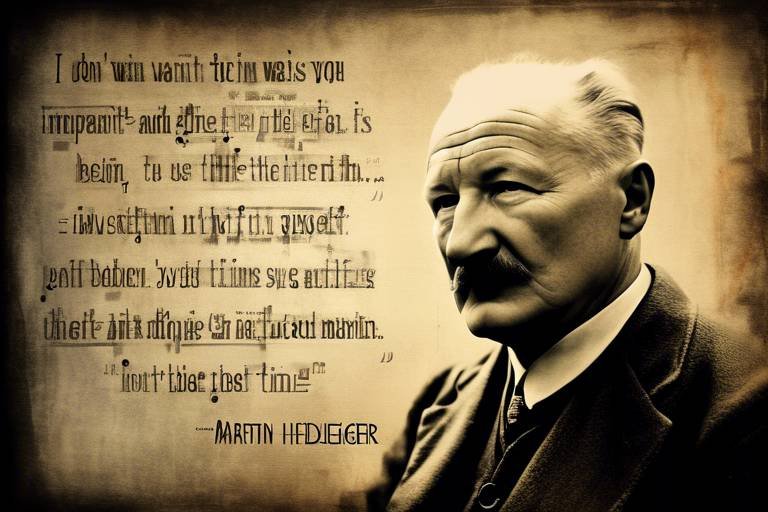Discussing the Philosophy of Immanuel Kant and His Influence
Immanuel Kant is one of the most influential philosophers in Western thought, and his ideas continue to resonate in various fields today. Born in 1724 in Königsberg, Prussia, Kant's work laid the groundwork for modern philosophy, challenging and reshaping how we understand knowledge, ethics, aesthetics, and politics. His philosophy is a treasure trove of insights that not only addresses the nature of human understanding but also confronts the moral dilemmas we face in our daily lives.
Kant's approach is often described as a revolutionary critique of traditional metaphysics. He argued that our understanding of the world is limited by our sensory experiences and that we cannot know things as they are in themselves. This idea was a significant shift from the rationalist views that preceded him, which posited that reason alone could lead to knowledge. Kant's emphasis on the interplay between experience and understanding opened new avenues for philosophical inquiry and laid the foundation for future explorations into epistemology and metaphysics.
One of the most captivating aspects of Kant's philosophy is how he intertwines his ideas with the broader context of the Enlightenment. This period was marked by a fervent belief in reason, autonomy, and progress, and Kant's work epitomizes these ideals. His famous essay, “What is Enlightenment?” encourages individuals to think for themselves, advocating for a society where freedom of thought is paramount. In this light, Kant is not merely a philosopher but a beacon of intellectual liberation.
Moreover, Kant's influence extends beyond philosophy into politics and ethics. His ideas about justice and moral law have shaped democratic thought and continue to inspire discussions about human rights and ethical governance. By establishing the Categorical Imperative, Kant provided a framework for evaluating moral actions that transcends cultural and temporal boundaries. This universal approach to ethics encourages individuals to act in ways that could be universally applied, fostering a sense of moral responsibility that is crucial in today's global society.
In exploring Kant's philosophy, we also encounter his profound insights into aesthetics. His work, “Critique of Judgment,” presents a compelling analysis of beauty and taste, arguing that aesthetic experience is both subjective and universal. This duality allows for a rich discourse on art and beauty that has influenced not only philosophers but also artists and critics throughout the centuries. Kant's belief that aesthetic judgments are grounded in a shared human sensibility continues to inform contemporary discussions about art and its value in society.
As we delve deeper into Kant's legacy, it becomes clear that his ideas are not confined to the realm of philosophy. They echo through the corridors of science, politics, and ethics, prompting us to reconsider our understanding of knowledge, morality, and beauty. His critical approach invites us to question the very foundations of our beliefs and encourages a rigorous examination of the principles that govern our lives.
In conclusion, Kant's philosophy is a rich tapestry of ideas that challenges us to think critically and act morally. His profound impact on modern thought cannot be overstated, and as we navigate the complexities of contemporary life, his insights remain a guiding light. Whether we are grappling with ethical dilemmas, aesthetic judgments, or the quest for knowledge, Kant's philosophy continues to inspire and provoke thought.
- What is the main idea of Kant's Critique of Pure Reason?
Kant's main idea in this work is that human understanding is limited to experiences and that we cannot know things in themselves, challenging traditional metaphysical views. - What is the Categorical Imperative?
The Categorical Imperative is Kant's foundational principle of ethics, which states that one should only act according to maxims that could be universally applied as a moral law. - How did Kant influence modern philosophy?
Kant's ideas laid the groundwork for various philosophical movements, including existentialism, phenomenology, and analytic philosophy, making him a central figure in modern thought. - What role did Kant play in the Enlightenment?
Kant embodied the spirit of the Enlightenment by advocating for reason, autonomy, and progress, encouraging individuals to think independently and challenge established norms.

Kant's Critique of Pure Reason
Immanuel Kant's Critique of Pure Reason is not just a book; it's a monumental shift in the landscape of philosophy. Published in 1781, this work challenges the very foundations of metaphysics, a field that had been dominated by the likes of Descartes and Leibniz. Kant asks a fundamental question: What can we know? This inquiry leads him to explore the limits of human understanding, revealing that our knowledge is not merely a passive reflection of the world but is actively shaped by our sensory experiences and cognitive faculties.
Kant introduces the idea of transcendental idealism, which posits that while we can know phenomena (the world as it appears to us), we cannot access noumena (the world as it is in itself). This distinction is crucial, as it suggests that our understanding is inherently limited. Imagine trying to take a photograph of a beautiful landscape, but your camera can only capture the view from a specific angle. No matter how hard you try, you can never fully represent the entire scene. Similarly, Kant argues that our perceptions are constrained by the structures of our mind.
To further elucidate his ideas, Kant employs the concept of categories of understanding. These are innate concepts that shape our experiences, such as causality, unity, and plurality. He argues that these categories are essential for us to make sense of the chaotic data we receive from the world around us. Without them, our experiences would be nothing more than a disordered collection of sensations. In this way, Kant revolutionizes epistemology by asserting that knowledge is a synthesis of sensory data and the mind's inherent structures.
Kant's work also delves into the synthetic a priori judgments, which are statements that are universally valid and informative yet do not rely on empirical evidence. For instance, the statement "7 + 5 12" is a synthetic a priori judgment. It is true regardless of our experiences, yet it expands our understanding of mathematics. This concept is pivotal in Kant's argument that certain knowledge is possible, even without direct experience.
In essence, the Critique of Pure Reason serves as a bridge between rationalism and empiricism, demonstrating that both perspectives have their merits while also highlighting their limitations. Kant's work invites us to reconsider the nature of knowledge and the role of human cognition in shaping our understanding of reality. The impact of this book is profound, as it paved the way for future philosophical inquiries and debates, influencing thinkers across various disciplines.
As we navigate through Kant's intricate ideas, it's essential to recognize that his philosophy does not merely reside in the realm of abstract thought. It has practical implications for how we perceive ethics, aesthetics, and even politics. The questions Kant raises about the nature of knowledge compel us to examine our assumptions and challenge the boundaries of our understanding, making his work as relevant today as it was in the 18th century.
In conclusion, Kant's Critique of Pure Reason is a transformative work that reshapes our understanding of knowledge and reality. By establishing the limits of human understanding and introducing the concepts of transcendental idealism and synthetic a priori judgments, Kant lays the groundwork for modern philosophy. His insights continue to resonate, inviting us to explore the intricate relationship between our minds and the world we inhabit.

The Categorical Imperative
The Categorical Imperative is arguably one of the most significant contributions of Immanuel Kant to the field of ethics. Unlike hypothetical imperatives, which are conditional and depend on individual desires (like "If you want to be healthy, you should exercise"), the Categorical Imperative is an unconditional moral law that applies to all rational beings. It demands that we act only according to that maxim whereby we can, at the same time, will that it should become a universal law. In simpler terms, it challenges us to consider whether our actions could be made universal without contradiction. Imagine if everyone acted the way you do—would that lead to a harmonious society or chaos? This fundamental question lies at the heart of Kant's ethical framework.
Kant proposed several formulations of the Categorical Imperative, each shedding light on different aspects of morality. The first formulation emphasizes universality, suggesting that one should act only according to principles that could be universally applied. The second formulation focuses on humanity, asserting that we should treat humanity, whether in ourselves or others, always as an end and never merely as a means to an end. This is a powerful reminder of the intrinsic value of human life, urging us to respect and uphold the dignity of every individual.
To better understand these formulations, let's break them down:
- Universal Law Formulation: Act only according to that maxim whereby you can, at the same time, will that it should become a universal law.
- Humanity Formulation: Act in such a way that you treat humanity, whether in your own person or in the person of any other, always at the same time as an end and never merely as a means to an end.
Kant believed that the Categorical Imperative provides a rational basis for morality, free from the influence of emotions or subjective inclinations. This is crucial because it establishes a framework for ethical decision-making that is consistent and impartial. By grounding morality in reason, Kant aimed to elevate ethical discussions above personal biases and societal norms, creating a universal ethical standard that could be applied across different cultures and contexts.
However, the Categorical Imperative is not without its challenges. Critics often point to its rigidity, arguing that it can lead to morally questionable outcomes in certain situations. For instance, what happens when a universal law conflicts with individual circumstances? Kant's philosophy demands adherence to the Categorical Imperative even in difficult moral dilemmas, which can seem impractical or overly demanding. Yet, this very challenge invites deeper reflection on the nature of morality and the principles that guide our actions.
Ultimately, the Categorical Imperative serves as a cornerstone of Kantian ethics, influencing not only philosophical discourse but also practical applications in law, politics, and everyday decision-making. It compels us to think critically about our actions and their implications, fostering a sense of moral responsibility that transcends personal interests. In a world filled with complex ethical dilemmas, Kant's emphasis on reason and universality remains a vital guide for navigating the moral landscape.
- What is the Categorical Imperative? The Categorical Imperative is a foundational concept in Kant's ethics, proposing that one should act only according to maxims that can be universally applied.
- How does the Categorical Imperative differ from hypothetical imperatives? Unlike hypothetical imperatives, which are conditional and based on personal desires, the Categorical Imperative is unconditional and applies to all rational beings regardless of individual goals.
- Why is the Categorical Imperative important? It provides a rational framework for moral decision-making, emphasizing the need for universality and respect for human dignity.
- Can the Categorical Imperative lead to rigid moral judgments? Yes, critics argue that its strict application can sometimes overlook individual circumstances, resulting in morally questionable outcomes.

Kant's Views on Aesthetics
Immanuel Kant, a towering figure in Western philosophy, brought a fresh perspective to the realm of aesthetics, which he explored in his seminal work, Critique of Judgment. In this text, Kant sought to bridge the gap between the realms of nature and freedom, arguing that our experience of beauty is not merely subjective but also has an objective basis. He posited that aesthetic judgments, while grounded in personal feelings, can still claim universal validity. This duality is what makes Kant's approach to aesthetics both fascinating and complex.
Kant introduced the idea that beauty is not just in the object itself but arises from the harmonious interplay between the observer and the object. He famously stated that "the beautiful is that which pleases universally without a concept." This means that when we find something beautiful, it is not just a matter of personal taste; rather, it resonates with a shared sense of beauty that transcends individual preferences. Kant believed that this shared appreciation is rooted in our common human faculties, allowing us to experience beauty in a way that can be communicated and understood by others.
In addition to beauty, Kant also explored the notion of the sublime, which refers to experiences that evoke a sense of awe or grandeur. The sublime, according to Kant, arises from the tension between our ability to comprehend something vast or powerful and the limits of our understanding. This experience can be both exhilarating and terrifying, pushing us to confront the boundaries of our own reason. For example, standing before a towering mountain or gazing into the vastness of the ocean can evoke feelings of the sublime, where nature's grandeur overwhelms our senses.
Moreover, Kant's aesthetic theory emphasizes the importance of disinterested pleasure. This concept suggests that true appreciation of beauty comes when we engage with an artwork or natural beauty without any ulterior motives or desires. In other words, we should appreciate beauty for its own sake, free from any personal gain or emotional investment. This idea has profound implications for how we approach art, encouraging us to engage with it in a purer, more contemplative manner.
To illustrate Kant's ideas on aesthetics, consider the following table that summarizes key concepts:
| Concept | Description |
|---|---|
| Beauty | Aesthetic judgments that claim universal validity based on shared human faculties. |
| The Sublime | Experiences that evoke awe and challenge the limits of our understanding. |
| Disinterested Pleasure | Appreciation of beauty for its own sake, free from personal motives. |
Through these concepts, Kant's exploration of aesthetics has shaped the discourse on art and beauty, influencing countless thinkers and artists. His ideas invite us to reflect on our own experiences of beauty and the deeper meanings they may hold. Have you ever stood before a piece of art or a breathtaking landscape and felt a profound connection? That feeling, according to Kant, is not just personal; it taps into a universal human experience that binds us all together.
In conclusion, Kant's views on aesthetics challenge us to consider the interplay between our subjective experiences and the objective qualities of beauty. By understanding his philosophy, we can deepen our appreciation for art and nature, recognizing that these experiences are part of a larger human endeavor to find meaning and connection in the world around us.
- What is Kant's main contribution to aesthetics? Kant's main contribution lies in his idea that aesthetic judgments can be both subjective and possess universal validity, allowing for a shared experience of beauty.
- How does Kant differentiate between beauty and the sublime? Beauty is associated with harmonious pleasure, while the sublime evokes awe and challenges our understanding, often leading to feelings of both exhilaration and terror.
- What does Kant mean by 'disinterested pleasure'? Disinterested pleasure refers to appreciating beauty without any personal motives or desires, engaging with art or nature purely for its own sake.

Critique of Judgment
Immanuel Kant's stands as a monumental work in the realm of aesthetics and teleology, bridging the gap between the realms of nature and freedom. In this insightful treatise, Kant investigates the nature of beauty and the experience of art, arguing that our judgments of taste are not merely subjective but possess a universal quality. He introduces the concept of disinterested pleasure, suggesting that true appreciation of beauty occurs when we detach our desires and interests from the object of our judgment. This idea revolutionized how we think about art and aesthetics, emphasizing that beauty is not just in the eye of the beholder but can be universally recognized.
Kant categorizes judgments of taste into two distinct types: subjective and objective. Subjective judgments arise from personal feelings and preferences, while objective judgments aspire to a universal consensus. Kant posits that when we declare something as beautiful, we are expressing a feeling that we believe others should also recognize. This notion challenges the prevailing relativism of his time, asserting that there is a common ground in our aesthetic experiences.
Moreover, Kant explores the idea of the telos, or purpose, in nature. He argues that our appreciation of beauty in nature reflects a deeper understanding of its inherent order and design. This leads to a profound realization: when we experience beauty, we are not only engaging with the object itself but also with the greater framework of existence. Kant's examination of aesthetics does not merely focus on the visual or sensory aspects but delves into the philosophical implications of how we perceive and interpret the world around us.
In the , Kant also addresses the relationship between art and morality. He suggests that art has the power to elevate our moral sensibilities, prompting us to reflect on our ethical responsibilities. This connection between aesthetics and ethics is crucial, as it highlights that the appreciation of beauty can lead to a deeper understanding of our place in the moral landscape of society.
To better understand Kant's contributions to aesthetics, let's summarize some of the key themes from the :
| Key Themes | Description |
|---|---|
| Disinterested Pleasure | The idea that true appreciation of beauty is free from personal desires or interests. |
| Universal Judgments of Taste | Judgments of beauty that aspire to a consensus among individuals. |
| Teleology in Nature | The belief that beauty reflects a purposeful order in the natural world. |
| Art and Morality | The connection between aesthetic appreciation and ethical reflection. |
Kant's not only laid the groundwork for modern aesthetic theory but also influenced countless thinkers and artists in the centuries that followed. His ideas continue to resonate today, prompting us to consider how our perceptions of beauty shape our understanding of the world, our ethical responsibilities, and even our political ideologies.
- What is the main argument of Kant's Critique of Judgment?
Kant argues that judgments of taste are not merely subjective but possess a universal quality, where true appreciation comes from a disinterested perspective. - How does Kant connect aesthetics to morality?
Kant suggests that the appreciation of beauty can elevate our moral sensibilities and prompt ethical reflection. - What impact did Kant's ideas have on modern philosophy?
Kant's aesthetic theories have influenced a wide range of disciplines, shaping contemporary discussions in philosophy, art, and ethics.

and how they shaped the discourse on aesthetics and taste.
Immanuel Kant's exploration of aesthetics, particularly in his seminal work, Critique of Judgment, marked a significant turning point in how we understand beauty and taste. Kant proposed that our appreciation of art and beauty is not merely subjective; rather, it is rooted in a shared human experience. He argued that aesthetic judgments arise from a certain kind of disinterested pleasure—an enjoyment that is not tied to desire or personal gain. This idea was revolutionary because it suggested that beauty could be appreciated universally, transcending individual preferences and cultural backgrounds.
At the heart of Kant's aesthetic theory lies the concept of the “free play” of the faculties. He posited that when we encounter a work of art, our imagination and understanding engage in a harmonious interaction that leads to a pleasurable experience. This interaction is what allows us to perceive beauty. Kant believed that this free play is essential for aesthetic judgment, as it enables individuals to appreciate art without the influence of external factors, such as moral or utilitarian considerations. In this way, he laid the groundwork for modern aesthetics by emphasizing the importance of the viewer's experience.
Moreover, Kant's distinction between the beautiful and the sublime further shaped the discourse on aesthetics. He described the beautiful as something that evokes pleasure through its form, while the sublime is associated with feelings of awe and terror, often found in nature's grandeur. This differentiation has had a lasting impact on how artists and critics discuss art, leading to a broader understanding of emotional responses to various artistic expressions. By categorizing these experiences, Kant provided a framework that continues to influence contemporary debates about art and aesthetics.
In addition to defining beauty and the sublime, Kant's philosophy also emphasized the role of taste. He suggested that taste is not merely a matter of personal preference but is instead a judgment that can be refined through education and cultural exposure. This idea implies that there are standards of taste that can be cultivated, which has led to a more structured discourse around what constitutes good art versus bad art. Kant's insights have prompted ongoing discussions in art criticism and theory, encouraging a more analytical approach to understanding aesthetic values.
Ultimately, Kant's contributions to aesthetics have fostered a rich dialogue that extends beyond philosophy into the realms of art, literature, and culture. His ideas challenge us to consider not just our personal reactions to beauty but also the broader implications of those reactions in a societal context. Through Kant, we learn that our appreciation of art is a complex interplay of cognition, emotion, and cultural understanding, which continues to resonate in contemporary discussions about aesthetics and taste.
- What is Kant's main contribution to aesthetics?
Kant's main contribution to aesthetics is his theory of the "free play" of the faculties, which posits that our appreciation of beauty arises from a harmonious interaction between our imagination and understanding. - How does Kant differentiate between beauty and the sublime?
Kant differentiates between beauty, which evokes pleasure through form, and the sublime, which elicits feelings of awe and terror, often associated with nature's grandeur. - What role does taste play in Kant's philosophy?
Kant argues that taste is not just personal preference but a judgment that can be refined through education and cultural exposure, suggesting that there are standards of taste. - How has Kant influenced modern discussions on art?
Kant's ideas have led to a more structured discourse around aesthetics, prompting ongoing discussions in art criticism and encouraging a more analytical approach to understanding aesthetic values.

The Influence of Kant on Modern Philosophy
Immanuel Kant's philosophy is like a pebble thrown into a pond; the ripples of his ideas extend far beyond the surface of his time, impacting various philosophical movements and disciplines. His work has not only shaped the course of philosophy but has also influenced fields like science, politics, and ethics. Kant's critical approach to understanding human experience and knowledge has paved the way for diverse philosophical inquiries, making him a towering figure in the realm of thought.
One of the most significant impacts of Kant's philosophy is seen in the emergence of **existentialism**. Thinkers like Jean-Paul Sartre and Martin Heidegger were influenced by Kant's ideas about subjectivity and the nature of existence. They took Kant's assertion that our understanding is shaped by our perceptions and expanded it to explore the individual's experience in an often absurd and chaotic world. This shift emphasizes personal freedom and responsibility, which are central themes in existentialist thought.
Moreover, Kant's influence can be traced in **phenomenology**, particularly in the works of Edmund Husserl. Kant's exploration of the structures of consciousness and how we perceive the world laid a foundation for phenomenology's focus on lived experience. Husserl's insistence on returning "to the things themselves" echoes Kant's emphasis on understanding our experiences rather than relying solely on abstract reasoning. This connection highlights how Kant's ideas resonate through the ages, encouraging philosophers to delve deeper into the intricacies of human perception.
In addition, Kant's impact is evident in **analytic philosophy**, where his emphasis on clarity, logical structure, and the importance of language has shaped contemporary philosophical discourse. Philosophers like Bertrand Russell and Ludwig Wittgenstein, who sought to dissect language and meaning, owe a debt to Kant's rigorous approach to philosophical inquiry. His insistence on distinguishing between **a priori** and **a posteriori** knowledge has become a fundamental aspect of analytic philosophy, influencing debates surrounding epistemology and metaphysics.
As we examine the broader implications of Kant's work, it's essential to recognize how his ideas have permeated various fields. For instance, in political philosophy, Kant's notion of autonomy and moral law has influenced modern democratic theories. His belief in the inherent dignity of individuals and the necessity of treating people as ends in themselves rather than means to an end has become a cornerstone of human rights discourse.
Furthermore, Kant's exploration of ethics and morality has led to ongoing discussions in contemporary moral philosophy. The **Categorical Imperative**, which advocates for universal moral principles, continues to be a touchstone for ethical theories, prompting debates about the nature of morality in a pluralistic society. This universality challenges us to consider how our actions affect others, fostering a sense of moral responsibility that transcends cultural and temporal boundaries.
In summary, the influence of Immanuel Kant on modern philosophy is profound and multifaceted. His critical examination of knowledge, ethics, and aesthetics has not only shaped philosophical thought but has also left an indelible mark on various disciplines. As we continue to grapple with the complexities of human existence, Kant's insights remain relevant, inviting us to explore the depths of understanding, morality, and the nature of our reality.
- What is the main contribution of Kant to modern philosophy?
Kant's critical philosophy laid the groundwork for modern epistemology and ethics, emphasizing the limits of human understanding and the importance of moral autonomy. - How did Kant influence existentialism?
Kant's ideas on subjectivity and human experience inspired existentialists to explore themes of freedom, responsibility, and the absurdity of existence. - What is the Categorical Imperative?
The Categorical Imperative is Kant's central ethical principle, stating that one should act only according to maxims that can be universally applied as a moral law. - In what ways did Kant affect political philosophy?
Kant's emphasis on autonomy and moral law has shaped modern democratic theories, influencing concepts of human rights and individual dignity.

Kant and the Enlightenment
Immanuel Kant stands as one of the most pivotal figures of the Enlightenment, a period that championed reason, science, and individualism over tradition and religious authority. His philosophy embodies the very essence of Enlightenment thought, emphasizing the importance of human reason and the capacity for individuals to think independently. Kant's assertion that "dare to know" encapsulates the spirit of this era, encouraging people to seek knowledge and challenge established norms.
During the Enlightenment, thinkers began to question the dogmas that had long dominated society. Kant contributed significantly to this intellectual movement by advocating for autonomy in thought and action. He believed that individuals should not merely accept beliefs handed down by authority figures but should engage critically with ideas. This perspective is evident in his works, where he argues that knowledge arises not just from sensory experience but from the mind's ability to process and understand that experience. In this way, Kant lays the groundwork for a new approach to knowledge that values rational inquiry.
Furthermore, Kant's philosophy promotes the idea of moral autonomy, suggesting that ethical principles should be derived from reason rather than external sources. This notion aligns perfectly with the Enlightenment's focus on individual rights and freedoms. Kant's famous Categorical Imperative serves as a universal moral law, urging individuals to act according to maxims that can be universally applied. This ethical framework not only reflects Enlightenment ideals but also challenges individuals to take responsibility for their actions in a society that values freedom and justice.
As we delve deeper into Kant's influence, we see how his thoughts resonate with the broader currents of Enlightenment philosophy. His critical approach to metaphysics and epistemology paved the way for later thinkers to explore the limits of human understanding and the nature of reality. Kant's insistence on the importance of reason and critical thinking has inspired countless movements and continues to shape discussions in philosophy, politics, and ethics today.
To further illustrate Kant's impact during the Enlightenment, consider the following table that highlights key aspects of his philosophy in relation to Enlightenment ideals:
| Kant's Philosophy | Enlightenment Ideals |
|---|---|
| Emphasis on Reason | Valuing rational thought over tradition |
| Moral Autonomy | Individual rights and freedoms |
| Critical Inquiry | Challenging established norms and beliefs |
| Universal Moral Law | Common ethical standards for all individuals |
In conclusion, Kant's contributions to the Enlightenment were profound and far-reaching. His ideas not only shaped philosophical discourse but also laid the groundwork for modern democratic thought. By advocating for reason, autonomy, and ethical responsibility, Kant embodies the spirit of the Enlightenment, inspiring generations to think critically and act justly.
- What was Kant's main contribution to the Enlightenment? Kant's main contribution was his emphasis on reason and moral autonomy, promoting the idea that individuals should think critically and derive ethical principles from reason.
- How did Kant's philosophy challenge traditional beliefs? Kant challenged traditional beliefs by arguing that knowledge and ethics should not be based solely on authority or tradition but should be derived from rational inquiry and individual reasoning.
- What is the Categorical Imperative? The Categorical Imperative is a central concept in Kant's ethical philosophy, which states that one should act according to maxims that can be universally applied as a moral law.

Critiques of Kantian Philosophy
Immanuel Kant's philosophy, while groundbreaking, has not escaped scrutiny and critique from various quarters. His ideas, particularly those articulated in his seminal works, have sparked considerable debate among philosophers, leading to a spectrum of interpretations and criticisms. One of the primary points of contention revolves around his notion of the transcendental idealism, which posits that our experience of reality is shaped by the innate structures of the mind. Critics argue that this view risks undermining the objective nature of knowledge, suggesting instead that knowledge is more fluid and influenced by external factors.
Moreover, Kant’s strict separation of phenomena (the world as we experience it) and noumena (the world as it is in itself) raises questions about the accessibility of true knowledge. Some philosophers, particularly empiricists like David Hume, contend that Kant's framework fails to account for the role of sensory experience in shaping our understanding of the world. Hume famously challenged the idea that we can have any knowledge beyond what is immediately observable, leading to a critical examination of Kant's epistemology.
Another significant critique stems from Kant's ethical framework, particularly the Categorical Imperative. While this principle aims to provide a universal moral law, critics argue that it can lead to rigid moral judgments that do not account for the complexities of human situations. For instance, the absolutist nature of the Categorical Imperative can sometimes result in morally questionable conclusions. Imagine a scenario where telling the truth could lead to harm; Kant’s philosophy would demand honesty regardless of the consequences, which many find problematic.
Furthermore, Kant's views on aesthetics, particularly in his Critique of Judgment, have also faced criticism. His assertion that beauty is a subjective experience yet possesses a universal quality has led to debates about the nature of taste and artistic value. Critics argue that this duality can create confusion, as it seems to contradict the very essence of subjective experience. How can something be both subjective and universal? This paradox invites skepticism about Kant's ability to provide a coherent account of aesthetic judgment.
Despite these critiques, it is essential to recognize that Kant's philosophy has spurred rich discussions and developments in various philosophical movements. The criticisms themselves have led to further exploration and refinement of philosophical ideas, illustrating the dynamic and evolving nature of philosophical discourse. For instance, existentialists and phenomenologists have built upon and reacted to Kant’s ideas, leading to new understandings of subjectivity and existence.
In summary, while Kant's contributions to philosophy are undeniably profound, they are not without their challenges. The critiques of his work highlight the ongoing dialogue within philosophy, reminding us that the quest for understanding is a continuous journey. As we reflect on Kant's legacy, it is clear that his ideas will continue to provoke thought, debate, and further inquiry for generations to come.
- What is the main critique of Kant's Categorical Imperative?
The main critique is that it can lead to rigid moral judgments that do not account for the complexities of human situations.
- How does Kant's philosophy influence modern thought?
Kant's ideas have influenced various philosophical movements, including existentialism, phenomenology, and analytic philosophy.
- What are the key challenges to Kant's epistemology?
Critics, especially empiricists, argue that Kant's separation of phenomena and noumena undermines the objective nature of knowledge.

Kant's Political Philosophy
Immanuel Kant's political philosophy is a rich tapestry woven from threads of ethics, freedom, and justice. At the heart of his thought lies the belief that true freedom is not merely the absence of constraints but the presence of rational self-governance. Kant argued that individuals must act according to laws they give to themselves, a concept that resonates deeply in democratic societies today. Imagine a society where every individual is not just a subject of authority but a participant in the creation of the laws that govern them. This is the essence of Kantian political thought, where autonomy and moral duty intersect.
One of Kant's most significant contributions to political philosophy is his idea of the "Kingdom of Ends." In this framework, he envisioned a community of rational beings who treat each other as ends in themselves, rather than as mere means to an end. This concept not only emphasizes the inherent dignity of every individual but also lays the groundwork for a moral society where justice prevails. Kant believed that a just society could only flourish when individuals recognize and respect the autonomy of others. In his view, political authority must be grounded in moral principles, ensuring that laws serve the common good rather than the interests of a select few.
Kant also made a strong case for the importance of perpetual peace, arguing that a federation of free states would be the best way to achieve lasting harmony. His essay, "Perpetual Peace: A Philosophical Sketch," outlines the conditions under which peace can be established and maintained. He posits that democratic governance, where citizens have a voice, is essential for peace. The idea is that when individuals have a stake in their government, they are less likely to engage in war. This notion echoes through modern international relations, where democratic nations often advocate for collective security and cooperation.
To further understand Kant's political philosophy, we can break down some of his key ideas:
- Autonomy: The capacity to govern oneself according to rational principles.
- Moral Law: Laws must reflect universal moral principles that respect the dignity of all individuals.
- Public Reason: Decisions should be made based on reasons that all citizens can accept, fostering a sense of community.
- Perpetual Peace: The vision of a world where nations coexist peacefully through mutual respect and cooperation.
However, Kant's political philosophy is not without its critiques. Some argue that his emphasis on rationality overlooks the complexities of human emotions and social dynamics. Others contend that his idealism may be impractical in a world rife with conflict and inequality. Despite these criticisms, Kant's insistence on the moral foundations of political authority remains influential. His thoughts invite us to question: What does it mean to be free? How do we ensure that our political systems reflect our moral values?
In summary, Kant's political philosophy serves as a beacon for those striving for a just society. His ideas challenge us to engage actively in the political process, to recognize the autonomy of others, and to work towards a world where peace is not just a dream but a reality. As we navigate the complexities of modern governance, Kant's insights remind us that true political authority must be rooted in ethics and the collective will of the people.
- What is the main idea of Kant's political philosophy?
Kant's political philosophy centers on the concepts of autonomy, moral law, and the idea of a just society governed by rational principles. - How does Kant view democracy?
Kant believes that democracy is essential for achieving perpetual peace, as it allows citizens to participate in the creation of laws that govern them. - What is the "Kingdom of Ends"?
The "Kingdom of Ends" is a concept where individuals treat each other as ends in themselves, respecting each person's inherent dignity. - What are some critiques of Kant's political philosophy?
Critics argue that Kant's focus on rationality may overlook emotional and social complexities, making his idealism seem impractical.

The Legacy of Kant's Philosophy
Immanuel Kant's philosophy has left an indelible mark on the landscape of modern thought, shaping not only the realm of philosophy but also extending its influence into various disciplines such as science, politics, and ethics. His ideas resonate with a profound depth that continues to inspire and challenge thinkers across generations. So, what is it about Kant that makes his legacy so powerful and relevant even today?
One of the most significant aspects of Kant’s legacy is his method of critical analysis, which encourages individuals to question the foundations of their beliefs and the limits of their knowledge. This critical approach has paved the way for various philosophical movements, including existentialism and phenomenology, which grapple with the nature of existence and human experience. Kant’s emphasis on reason and autonomy during the Enlightenment period has also fostered a spirit of inquiry that remains at the core of academic and intellectual pursuits.
Moreover, Kant’s ethical framework, particularly the Categorical Imperative, has had a lasting impact on moral philosophy. This principle not only serves as a guide for personal conduct but also influences contemporary discussions about human rights and justice. In a world that often grapples with moral ambiguity, Kant’s insistence on universal moral laws provides a framework for evaluating ethical dilemmas. His ideas encourage us to consider the broader implications of our actions and to act in ways that respect the dignity of all individuals.
In the realm of aesthetics, Kant's work in the Critique of Judgment has profoundly shaped our understanding of beauty and taste. His exploration of the relationship between the observer and the artwork has influenced artists, critics, and philosophers alike. The notion that aesthetic judgments are both subjective and universal has sparked debates about the nature of art and its role in society, making Kant a central figure in discussions about creativity and expression.
Furthermore, Kant's political philosophy, which emphasizes freedom, justice, and the moral foundations of political authority, has laid the groundwork for modern democratic thought. His belief in the intrinsic worth of individuals and the importance of rational discourse in governance resonates in contemporary political systems and movements advocating for democracy and human rights. Kant's vision of a cosmopolitan society, where individuals can coexist peacefully, continues to inspire global efforts toward unity and cooperation.
As we reflect on Kant’s legacy, it becomes clear that his ideas are not confined to the pages of philosophical texts; they are alive and thriving in our everyday lives. From the way we engage in ethical discussions to how we appreciate art and navigate political landscapes, Kant's influence is pervasive. His ability to stimulate critical thought and promote moral reasoning makes him a timeless figure in the annals of philosophy.
In conclusion, Kant's philosophy serves as a bridge between the past and the present, inviting us to explore the complexities of knowledge, morality, and aesthetics. His legacy is a testament to the power of human reason and the enduring quest for understanding, making him a pivotal figure in the intellectual history of the Western world.
- What is the Categorical Imperative? The Categorical Imperative is a central concept in Kant's moral philosophy that acts as a universal moral law, guiding ethical decision-making.
- How did Kant influence modern philosophy? Kant’s critical approach and ideas about knowledge, ethics, and aesthetics laid the groundwork for various philosophical movements, including existentialism and phenomenology.
- What role did Kant play in the Enlightenment? Kant embodied the spirit of the Enlightenment by promoting reason, autonomy, and progress, challenging traditional beliefs and encouraging intellectual inquiry.
Frequently Asked Questions
- What is the main focus of Kant's Critique of Pure Reason?
Kant's Critique of Pure Reason primarily challenges traditional metaphysics by establishing the limits of human understanding. He argues that our knowledge is shaped by both experience and reason, suggesting that we can only know things as they appear to us, not as they are in themselves.
- How does the Categorical Imperative function in Kant's ethical framework?
The Categorical Imperative serves as a universal moral law that guides ethical decision-making. It emphasizes that actions should be undertaken only if they can be universally applied, promoting the idea that we should treat others as ends in themselves, not merely as means to an end.
- What are Kant's views on aesthetics and beauty?
Kant's perspective on aesthetics, particularly in his work Critique of Judgment, posits that beauty is subjective yet universal. He argues that our judgments of taste are based on a shared sense of pleasure, which transcends personal preferences and reflects a common human experience.
- In what ways did Kant influence modern philosophy?
Kant's ideas have had a profound impact on various philosophical movements, including existentialism, phenomenology, and analytic philosophy. His emphasis on reason and autonomy has shaped discussions around human existence, knowledge, and ethics in contemporary thought.
- What role did Kant play during the Enlightenment?
Kant's philosophy embodies the spirit of the Enlightenment, emphasizing reason, autonomy, and progress. His works encouraged individuals to think critically and independently, promoting the idea that enlightenment comes from the courage to use one's own understanding.
- What are some common critiques of Kantian philosophy?
Critiques of Kant's philosophy often come from both empiricists and rationalists. Critics argue that his reliance on reason may overlook the importance of sensory experience, while others challenge the practicality of his ethical principles in real-world situations.
- How did Kant contribute to political philosophy?
Kant's contributions to political thought focus on concepts of freedom, justice, and the moral foundations of political authority. He believed that a just society is one where individuals are treated as autonomous agents, capable of making rational decisions for themselves.
- What is the legacy of Kant's philosophy today?
The legacy of Kant's work continues to influence a wide range of disciplines beyond philosophy, including science, politics, and ethics. His ideas about reason and morality remain central to ongoing debates in these fields, demonstrating the lasting relevance of his thought.



















